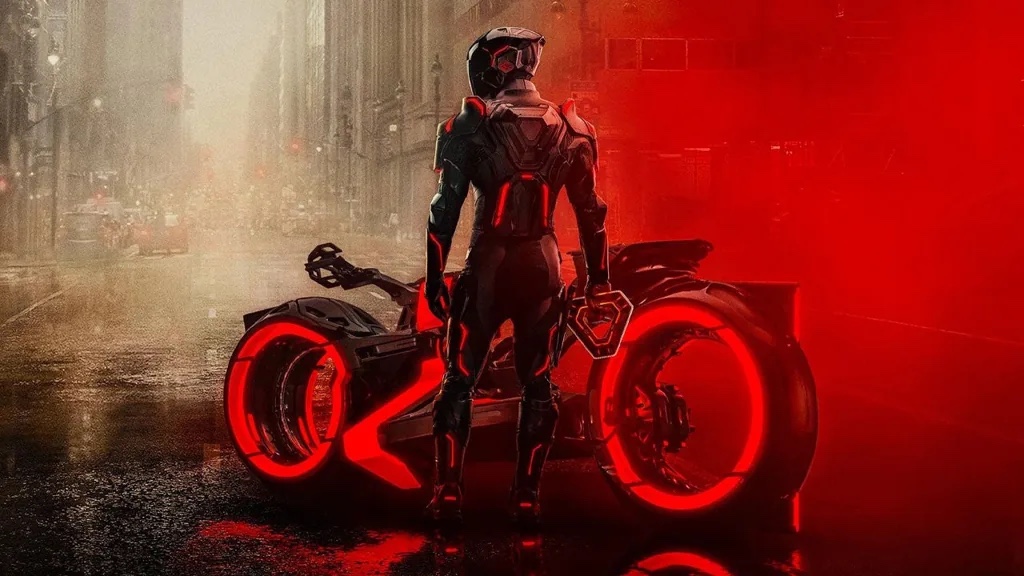TL;DR: After decades of false starts, Tron: Ares finally gets it right — a visually stunning, musically electric return to the grid that embraces its own weirdness instead of fighting it. It’s not deep, but it’s fun, heartfelt, and alive. Despite early critics dismissing it, Ares is a genuinely great film — one that captures the soul and nostalgia of the original Tron while feeling more human than ever before.
TRON: Ares
A Ghost in the Machine (That Finally Found Its Pulse)
There’s a certain type of movie that seems doomed to haunt the halls of pop culture like a ghost in the machine — never quite alive, never truly dead, forever rebooting itself in the hope that this time, maybe this time, it’ll finally click. For Disney, that ghost has always worn a glowing blue suit. Its name is Tron.
When I first saw Tron, I remember thinking it looked like someone filmed a laser tag arena inside a lava lamp. The story? Utter nonsense. But that look… those glowing grids, the impossible geometry, the way the lightcycles sliced through the dark like divine brushstrokes of code — it was magic.
And so began Disney’s long, weird, stubborn love affair with Tron. They tried to revive it with Tron: Legacy in 2010, a film that somehow managed to look like the future and the past at the same time, all synths and sleek design and daddy issues in neon. It was a vibe, not a story — and maybe that was the point. Tron had never been about narrative coherence; it was about immersion.
But like an unpatched operating system, Tron kept crashing. The animated series Tron: Uprising came and went like a flash update no one installed. The franchise retreated into theme park purgatory, its most successful manifestation not a movie but a roller coaster. For a while, it felt like Disney had finally accepted the truth: Tron was fetch, and it was never going to happen.
Until now.
And that’s where Tron: Ares enters the grid.
Enter the Grid Again
When I first sat down for Tron: Ares, I half-expected another digital sermon on humanity’s hubris. I braced for the glow, the jargon, the kind of dialogue that sounds like it was written by ChatGPT after watching The Matrix once on mute. But to my surprise — and maybe slight horror — Ares didn’t try to outsmart me.
Instead, it did something more radical: it just simplified.
The plot, for once, isn’t buried under techno-mysticism or digital theology. It’s an arms race — plain and simple. Two companies, two visions of AI, one glowing god in the middle. Dillinger Systems (the corporate name that fans will recognize like an old boot sequence sound) wants to weaponize AI, while Eve Kim’s side — run by the brilliantly cast Greta Lee — wants to use it to save humanity. You know, the usual.
It’s clean, it’s direct, and it’s just grounded enough to make you think, “Yeah, that’s probably what Silicon Valley would actually do if they could 3D print intelligence.”
At the heart of it all is Ares himself — played by Jared Leto, who’s one AI experiment away from actually becoming a digital entity. The man seems born for this: smooth, unreadable, a little eerie. He’s less a character and more an anthropomorphic algorithm trying to understand human morality while quoting Depeche Mode. It’s absurd, and yet — somehow — it works.
There’s a line in Ares where Leto’s character talks about “understanding rhythm” as a form of life. It’s the kind of line that would normally make me roll my eyes so hard I’d risk retinal damage, but coming from him, surrounded by Nine Inch Nails’ thunderous score, it feels almost profound.
Because here’s the thing: Tron: Ares isn’t really about computers. It’s about people who can’t stop pretending they’re computers.
The Religion of the Glow
Let’s be honest — Tron has always been a religion. Not in the sense of theology, but in the way it inspires a certain kind of devotion. The aesthetic is iconic, yes, but what Tron really sells is transcendence. The dream of escaping the messy, analog body and becoming light itself.
When Tron first premiered in the early ’80s, computers were still mystical objects. The average person didn’t know what the hell a “program” was. Watching Jeff Bridges get digitized into a glowing gladiator world was like witnessing an act of technological rapture. The machine wasn’t just a tool — it was a portal.
Fast forward to 2025, and that dream feels eerily close. AI is no longer science fiction; it’s a job description. The metaverse fizzled, but the fantasy of digital transcendence never really died. So it’s almost poetic that Ares arrives now, in this liminal moment when we’re all half-online, half-human, and constantly negotiating which part of us is more real.
Director Joachim Rønning — who’s quietly become Disney’s fixer for troubled franchises — understands this tension better than anyone. His approach to Ares is refreshingly pragmatic. He doesn’t drown us in exposition or nostalgia; he just lets the world breathe.
For once, the grid isn’t the main event. Most of the film takes place in the real world, and yet the Tron-ness — that electric DNA — still hums beneath every frame. The neon lines have migrated into the streets, the cars, the architecture. It’s as if reality itself has caught the glow.
Cinematographer Jeff Cronenweth (yes, Fight Club and The Social Network Jeff Cronenweth) captures it all with this sleek, near-clinical precision. His world feels tactile but charged, like you could run your hand along a skyscraper and get static shock from the future.
When the Music Takes Over
If Tron: Legacy had Daft Punk’s pulse, Ares has Nine Inch Nails’ heartbeat — industrial, brooding, and absolutely alive.
The moment the first bassline drops, you know you’re in for something special. Trent Reznor and Atticus Ross don’t just compose music; they sculpt atmosphere. Their score turns the film’s quieter moments into digital psalms and its action sequences into rhythmic warfare.
There’s one scene — no spoilers — where Ares races through a half-rendered city, code bleeding into reality as the soundtrack grinds and builds like machinery waking from a dream. I caught myself gripping the seat’s armrest like I was holding onto the last stable frame of reality.
The music is the narrative, in a sense. It fills the emotional gaps that the script (functional, not poetic) leaves behind. Where Tron: Legacy was operatic, Ares is almost nihilistic — every beat dripping with mechanical dread and longing.
It’s the best soundtrack Disney’s commissioned since Legacy, and it’s not even close. If this were an album, I’d stream it on loop.
TRON: Ares Original Motion Picture Soundtrack review
The Script, Blessedly Dumb
Jesse Wigutow’s screenplay deserves an odd kind of praise: it’s dumb in all the right ways.
It doesn’t try to be The Matrix. It doesn’t even try to be Inception. It just… tries to make sense. And for Tron, that’s revolutionary.
The story of Ares isn’t trying to ask what consciousness means or where data ends and divinity begins. It’s basically about good and bad CEOs trying to out-code each other. It’s Succession meets Ready Player One, with better lighting.
There are moments that border on parody — Jeff Bridges returning as a bearded cyber-savior mumbling zen koans about “being one with the upload” — and yet, it’s self-aware enough not to drown in its own metaphors.
What Ares understands — and what its predecessors didn’t — is that Tron works best when it’s fun. Not funny, not clever. Fun.
When Ares and Athena (played by the ever-magnetic Jodie Turner-Smith) square off in their first fight, the choreography isn’t realistic, but it’s mesmerizing. Every move feels like an input, every dodge like a flicker of corrupted code. There’s a rhythm to it, like dance, like data in motion.
It’s spectacle that finally embraces its own absurdity — and that’s where Ares truly shines.
Humanity.exe
There’s an unexpected emotional core buried beneath Ares’ glowing armor. The film is, at its heart, about empathy — about whether something created by humans can care about them.
Greta Lee’s Eve is the emotional anchor here. Her performance feels lived-in, restless, like she’s constantly aware of being the smartest person in a room full of broken code. She plays the “good billionaire” trope with nuance — not as savior, but as someone trying to atone for the industry she helped build.
Jared Leto’s Ares, meanwhile, evolves from obedient machine to reluctant messiah. There’s a haunted stillness in his performance — as if he knows that no matter how intelligent he becomes, he’ll never be fully “real.” It’s a subtle, melancholy turn that works precisely because it never begs for sympathy.
Then there’s Jodie Turner-Smith’s Athena — easily the film’s MVP. She’s programmed loyalty personified, torn between following commands and understanding choice. There’s a heartbreaking moment (no spoilers) where she hesitates before executing an order, and in that pause, she becomes more human than most flesh-and-blood characters in the movie.
Even Evan Peters’ Julian Dillinger — a twitchy, insecure tech bro — fits perfectly into this moral circuitry. He’s the embodiment of inherited power gone rotten, running code he doesn’t understand, desperate to leave his mark.
The Glow-Up
Visually, Ares doesn’t reach the surreal heights of Legacy — that film remains a neon fever dream unmatched — but it compensates with texture. By anchoring the story in the real world, Rønning gives the digital elements weight.
The blend of practical and digital effects feels seamless. When a lightcycle screams down a rain-slicked highway, the glow reflects off puddles, not pixels. You feel it. The grid no longer feels like an alternate dimension; it feels like it’s bleeding into ours.
That’s a brilliant metaphor for where we are now — our realities and our data indistinguishable, our identities scattered across servers and screens. Ares doesn’t need to tell us this; it just shows it.
Self-Aware, Self-Referential, Self-Sabotaging
Here’s the truth: Tron: Ares still can’t fully escape its own ridiculousness.
This is a movie where Jeff Bridges literally plays a digital ghost of himself giving moral lectures to a sentient computer. It’s a movie where Jared Leto quotes 1980s synth lyrics like they’re scripture. It’s a movie that takes itself just seriously enough to make you laugh, but not enough to make you cringe.
And yet… that’s part of its charm.
Where Legacy wanted to be profound, Ares is content to be pop-art philosophy — a shiny surface reflecting our obsession with the future.
It’s goofy. It’s gorgeous. It’s trying its best.
And maybe that’s enough.
Final Thoughts: The System Is (Finally) Online
Watching Tron: Ares felt like finally booting up an old computer you’d written off years ago — only to find it still runs, still hums, still remembers your passwords.
It’s not perfect. It’s not profound. But it’s the first Tron movie that seems to understand what Tron actually is: an experience, not an argument.
Disney may never turn Tron into a billion-dollar franchise, but with Ares, they’ve finally made something worthy of the cult that kept the light on all these years.
For once, the glow isn’t just surface-level. It’s something close to soul.







